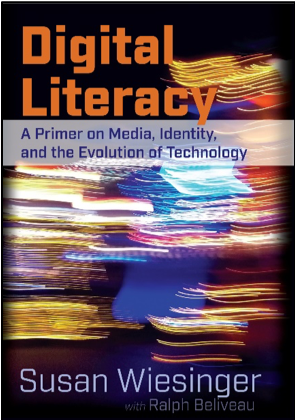Publication Details
| OLOR Series: | ROLE Reviews |
| Author(s): | Diane Martinez |
| Original Publication Date: | 15 March 2018 |
| Permalink: |
<gsole.org/olor/rolereviews/2018vol1no1.rev8> |
Publication Note
This review was originally published in Research in Online Literacy, vol. 1, no. 1 (2018).
Resource Overview
Media, Figures, Tables |
Resource Contents
Review of Digital Literacy: A Primer
Readers and educators should not be fooled by the word “primer” in the title of Digital Literacy: A Primer on Media, Identity, and the Evolution of Technology by Susan Wiesinger, as this book is rich with potential for exciting, deep, and meaningful learning and discussion for both undergraduate and graduate students.
Wiesinger does an excellent job of covering critical issues regarding digital literacy, and it is her direct, succinct, and informational style that would make this book a valuable text in any class that addresses digital literacy. Technological change is explored through historical, cultural, and critical perspectives, which are not prescribed but presented with broad strokes that introduce or clarify important, basic concepts and leave ample room for educators and students to explore issues from a more complex, critical standpoint that pertains to the subject matter and educational level of an individual course.
Thirteen chapters introduce a myriad of subjects including the evolution of contemporary media that puts a whole new spin on the relevance of Marshall McLuhan’s perspectives on technology and society; infrastructure of the Internet and the Web; cultural changes brought about by technology, such as the culture of “me,” being “on” all the time; and what it means to collaborate and be part of a community. Digital identity, privacy, legalities, access, and corporate colonialism are also addressed. The book is loaded with terminology that is clearly defined and issues that are broached but leave readers to explore them to the desired depth. For example, in “From Neighbors to Followers,” readers learn about digital identity, interactions, and community, and they are prompted to learn more about the cultural and political consequences when group communication is limited to only like-minded people. They are also encouraged to consider the social implications of living in an echo chamber or what it means to participate in social media shaming campaigns or “collective fury.” In the chapter on “Digital Haves and Have-Nots,” readers are introduced to concepts like marginalization, technology and information gaps, global and domestic divides, and information control, which lead nicely into the next chapter, “The Web at Its Best: A Conduit for Social Movements & Change,” where technology and social change are discussed through movements like Black Lives Matter, the Arab Spring, and protests surrounding the shooting of Michael Brown in Ferguson, Missouri. Case studies are presented in ways that do not argue one perspective over another but rather promote further research and critical discussion in terms of the way technology is used and affects lives today.
As a class text, Digital Literacy is accessible for both undergraduate and graduate students. “Takeaway” statements are thought-provoking foundational concepts at the beginning of each chapter that provide context for chapter reading and further research. Additional research topics can be taken from the chapter summaries and list of important concepts at the end of each chapter. Helpful appendixes include how to write in electronic environments, “Email Etiquette,” “Blogging Guidelines,” “Professional Use of Social Media,” how to read a URL, and “File Management.”
Whether educators choose to have students read the book in entirety or if individual chapters are used piecemeal, Digital Literacy is an excellent resource for learning about and exploring the significance of technology in our lives today and developing informed speculation about the future.
About the Reviewer
Diane Martinez is an assistant professor of English at Western Carolina University where she teaches professional and technical communication courses. She also serves as the Professional Writing Program Director. Her research interests include technical communication and globalization, advocacy in technical communication, the Bologna Process, digital literacy, and online education.



